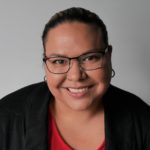Dr Jacynta Krakouer (she/her) is a Mineng Noongar woman from southern Western Australia. She lives and works on Wurundjeri Country in Naarm. Born in Western Australia, Jacynta grew up in Naarm and has lived in Naarm for most of her life. A social worker by background, Jacynta is an academic working in health and social care research, with her particular expertise in relation to child protection and out-of-home care. She is a Postdoctoral Research Fellow in the Health and Social Care Unit (HSCU) at Monash University. An early career researcher, Jacynta’s PhD in social work at the University of Melbourne focused on cultural connection for First Nations children and young people in out-of-home care in Victoria. Jacynta previously worked as an Associate Lecturer in the Department of Social Work at the University of Melbourne, and has sat on multiple expert committees relating to First Nations children and young people in child protection and out-of-home care. Jacynta is passionate about Indigenous self-determination and Indigenous-led research. She is committed to advocating for the needs of First Nations families who experience contact with multiple systems across health and social care. Qualifications: BSc, MSW, MSP, PhD Melb
Dr Indigo Willing (she/her) is a sociologist, research consultant and community volunteer. She currently lives in Meanjin on the land of the Jagera and Turrbal Peoples. Her theoretical and empirical work examines issues of power, social change and representation. Her research and community work creates bridges between academia and community sectors, and spans a number of social worlds that reflect her own diverse background and lived experiences as a Vietnam War orphan and adoptee, an Asian Australian creative, academic and skateboarder involved with inclusive community building projects. This includes establishing the Adopted Vietnamese International (AVI) network, co-founding Consent is Rad and We Skate QLD, and the Asian Australian Films, Forum, and News Network.
Synopsis:
What does it mean to be part of a community without access to your birthing stories? Dr Jacynta Krakouer, a Mineng Noongar social worker and Dr Indigo Willing, a sociologist and adoptee from Vietnam contribute a powerful discussion about the history and politics of out-of-home care and inter-country adoption addressing justice, kinship, and belonging. Jacynta and Indigo bring their lived experience and their community advocacy into dialogue with a critical analysis of the institutions and mindsets that underpin how children are born in the lands now known as Australia.
Notes:
Links to Jacynta’s work
ResearchGate
Google Scholar
Separated at birth: Racism and unconscious bias in perinatal health services
The Family Matters report 2022
First Nations families need support to stay together, before we create another Stolen Generation
First Nations children are still being removed at disproportionate rates. Cultural assumptions about parenting need to change
Links to Indi’s work
Research Gate
Google Scholar
Siren Spotlight: Hybrid academic careers in sport—bridging scholarship, community, and consultancy work
Podcast interview on The Vietnamese with Kenneth Nguyen
Erika Hayasaki presents “Somewhere Sisters” with Indigo Willing
We Skate Queensland
Music
Music in this episode includes ‘Developing Peace Health Wellness’ by Luca Tomassini, and ‘Native American Dream’ by AudioLion used under an Audio Standard Licence from Adobe Stock.
Birthing and Justice is written and produced by Dr Ruth De Souza on the traditional and unceded lands of the Boon Wurrung people of the Kulin Nations. Sound editing by Olivia Smith.
